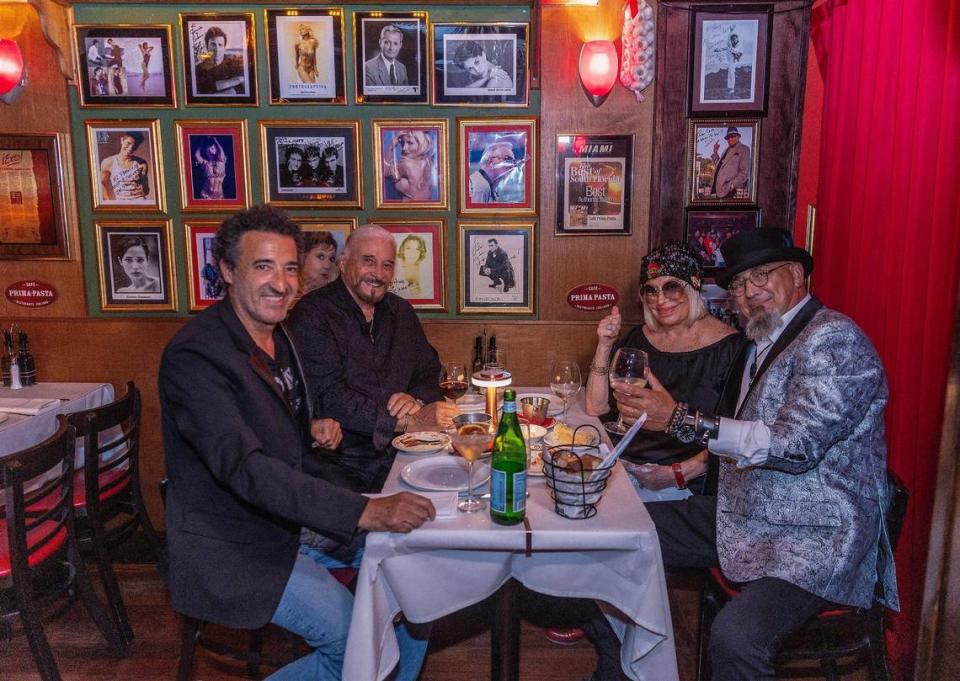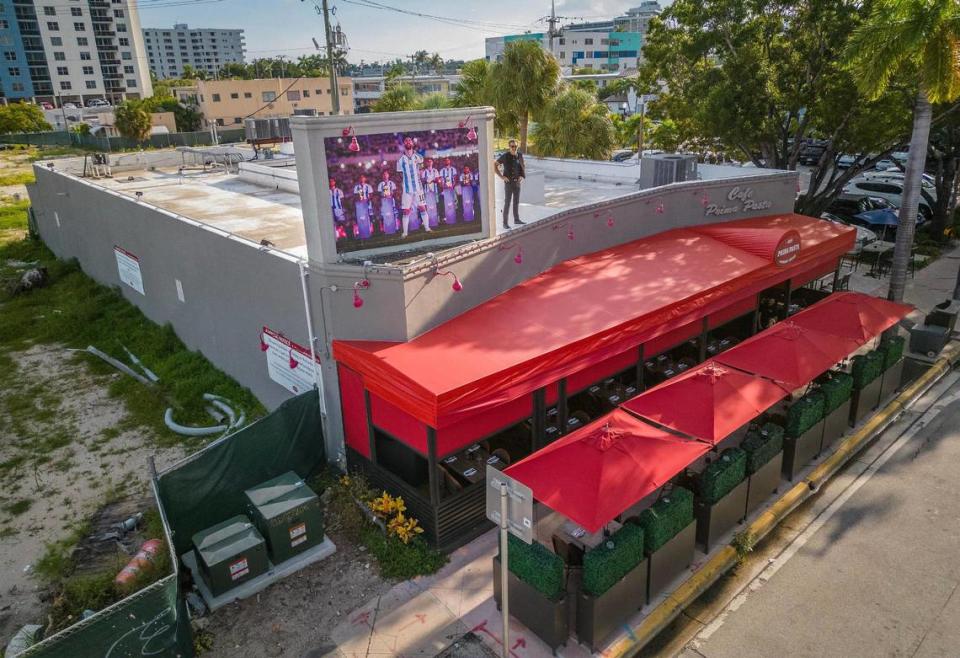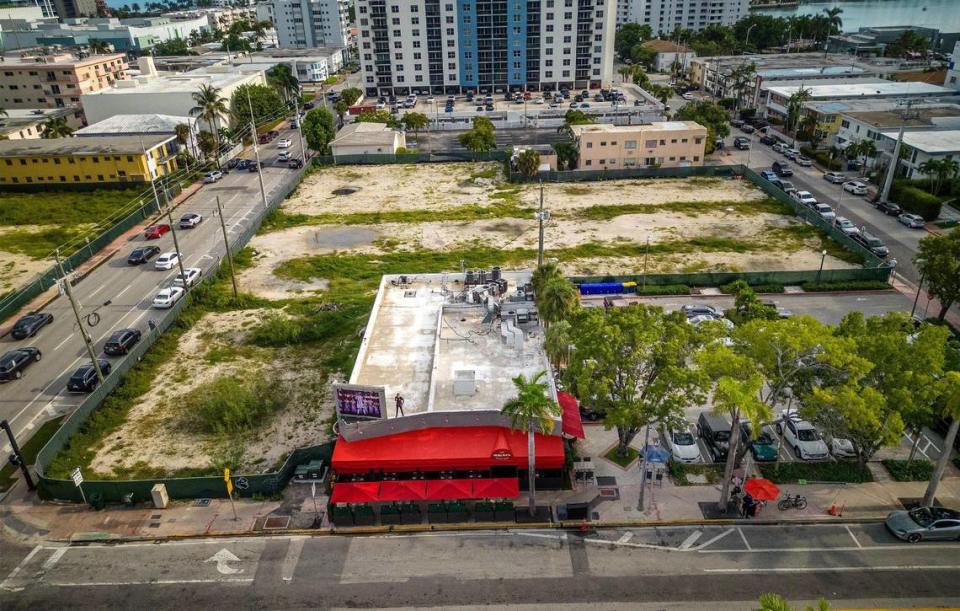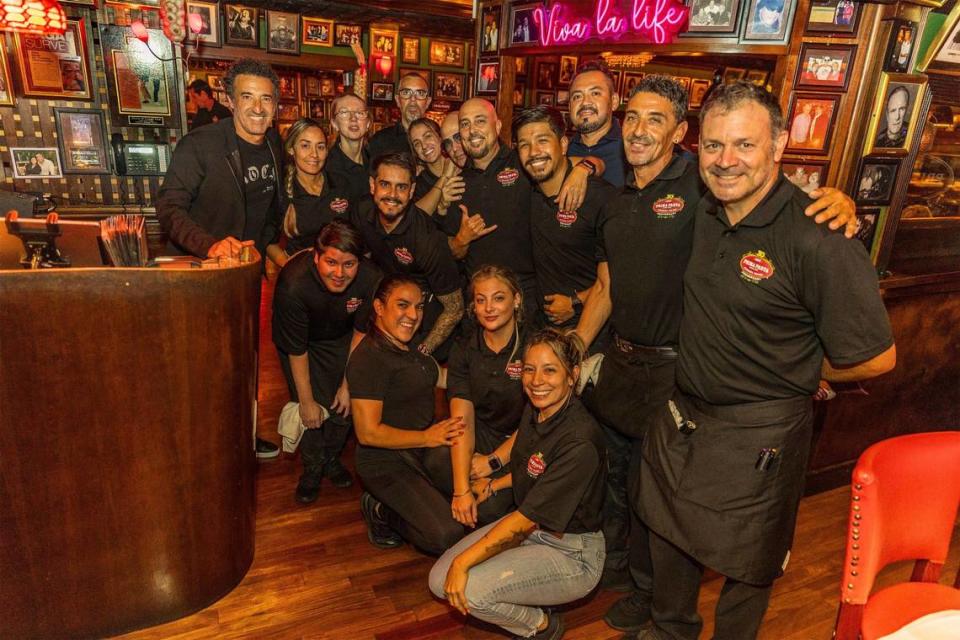The secret sauce? Amid redevelopment of North Beach, restaurant stands test of time
A few years ago, Gerardo Cea would roam his Italian restaurant at 2 a.m. contemplating another multimillion-dollar offer from a developer eager to buy his Miami Beach restaurant. Although Cafe Prima Pasta is a household name for many in the city and beyond, builders were interested in the prime real estate rather than the homemade pasta sauces.
When Cea strolled the wood-paneled dining rooms lined with framed photos of acclaimed musicians like Billy Joel and Madonna the entrepreneur admired — and many of whom have eaten there — he always searched for the same picture. The first one he hung in October 1993 when the restaurant opened. That picture of the Empire State Building always reminded him of the long journey it took to open his own eatery, and kept him grounded in what mattered the most to him — family and community — at a time when financial temptation knocked on his door every day.
Today, Cea celebrates his nationally recognized restaurant turning 30. A look inside shows how much the place has grown and aged well. A musician on the side and Emmy-winning composer, Cea added a music studio, as well as more dining rooms in the single-story building at 414 71st St. The ambiance remains the same, starting with a hostess or the 20-year Prima Pasta employee and bartender, Henry Villar, greeting customers at the door.
The menu has expanded over the years to include selections by Cea and his father Arturo — all taste-tested and approved by his mother, Carla Cea. With help from his older brother Fabian, the younger Cea manages the business that has stood the test of time and the changes around it.
In fact, it’s the last family-owned business on a block razed by bulldozers. North Beach is undergoing a tidal wave of redevelopment. Motivated by a revitalization plan for a community “town center” approved in 2018 by Miami Beach that allows for tall residential towers and apartment buildings including small studios and local stores, many developers wanted to build a new generation for this neighborhood.
In an area undergoing so much transformation, Cea wants to ensure Prima Pasta stays the same, providing comfort food to people during changing times. To him, and loyal patrons would agree, establishments like his belong in the neighborhood’s future, acting as a bridge between the old and new.
“North Beach has been changing a lot and we’ve had a lot of offers to buy this property, but we decided to stay,” Cea said. “Maybe in the future, I don’t know what else will come around, but for now we just want to concentrate here and be part of this new North Beach [that is] coming.”

North Beach, Miami Beach’s small potatoes?
Lori Nieder, the chief financial officer of the Miami Beach Tennis Academy, said she’s supportive of the wave of development in North Beach.
“It’s different from the past. I’m seeing a lot of young families move to the neighborhood. It’s pretty unusual we’re getting families from New York to this neck of the woods, because we were always the stepchild of Miami Beach,” the 20-year resident said. “I feel like there’s a lot of positivity coming.”
Bordered by the ocean, Surfside, Mid-Beach, and Normandy Isles, the area’s last golden age came soon after World War II, said Daniel Ciraldo, executive director of the Miami Design Preservation League. Many veterans who trained in Miami Beach decided after the war to buy their slice of paradise using the G.I. Bill. The demand created a boom in small, single-family home construction and boutique buildings. The neighborhood became known for housing the city’s middle and working classes.

Demand fizzled for North Beach after the post-World War II boom. Why? Geography, Ciraldo said. South Beach and Mid-Beach’s proximity to the Miami-Dade County mainland and the region’s economic center, the urban core and port. As a result, it became easier for North Beach to preserve some of its historic sites or significant centers: the Miami Beach Bandshell, and, steps from Prima Pasta, the now-closed Byron Carlyle theater.
By the 1980s and 1990s, North Beach felt like it had become the redheaded stepchild of Miami Beach, overlooked by the city and hardened by crime, abandoned streets and little neighborhood investments.
But it was in mid-1993 when Cea went to North Beach and found a bright future for his Italian restaurant.
Starting from scratch
Cea found Prima Pasta’s home during one of his worst nights. During mid-1993, he had just gotten laid off from his gig at the now-closed La Bussola Ristorante in Coral Gables.
It was another bump in the road, since his family left native Buenos Aires in Argentina in 1985 for a better life in the United States. Infatuated with the depictions of the United States in films such as Saturday Night Fever, at 17 Cea left for New York City with his parents. A high school dropout, he convinced his parents there was a better future for them outside South America. And so they went, leaving behind Cea’s older siblings, grandparents and friends.
Cea found a different reality in this country from the one Hollywood painted in its box office hits. The path to grow and build a strong financial future was a difficult one. Most of the waiters he met while working in restaurants spent their entire careers serving customers. He knew he wanted something more. That’s where Miami came in.

His family relocated to Miami in 1988. Miami, though, served its own set of challenges. Cea and his family worked in other restaurants, and found their income fluctuated based on the season. He thought he was in a rut, especially after getting laid off. One night, Cea left his home in North Bay Village to catch a film with friends at the Byron Carlyle, the North Beach neighborhood cinema. He parked and walked towards the movie theater when he happened to pass a building with a sign to rent a vacant part of it for $1,000 a month.
In an instant, Cea knew this was his chance to go from restaurant employee to owner. Within days, he met with the leasing agent, convinced the man to sign him as a tenant. In short order, he worked to launch Prima Pasta, relying on his and his family’s $30,000 in savings.
He opened the restaurant with a bar and 28 seats, far less than the 140 today. The menu — carefully crafted by Cea, prepared by his father and tested by his mother — quickly drew repeat customers. Prima Pasta, Cea said, was a hit from day one. By 1999, Cea negotiated to buy the building that had also included two small offices for $400,000.
Residents and others interviewed for this story knew Prima Pasta. It has become, those interviewed said, a staple of the North Beach community, a watering hole and place to eat where everyone is welcomed.
“I go there every other week,” longtime neighborhood resident Nieder said. “The food is always reliable and yummy. I love their lychee martini. The portions are big and there’s always leftovers to bring home. It’s just very reliable. Great service.”
What’s cooking nearby?
Outside Prima Pasta, developers are setting up the next chapter of North Beach. It all started nearly five years ago when Miami Beach officials crafted that town center master plan, giving room and incentives for more housing and retail.
Pacific Star Capital co-founder and CEO Aria Mehrabi came in 2017. He was among the first investors in the neighborhood, and one of the most persistent in trying to get Cea to sell his restaurant building. He couldn’t pry the property from the restaurateur, but managed to scoop up almost the entire block surrounding the restaurant and a piece of land across 71st Street. After bulldozing the single-story buildings and surface parking lots, Mehrabi said he plans to build two, 10-story apartment rental properties with 287 apartments and a Target neighborhood store.
“One of the reasons why we’re attracted there is gentrifying the area. Gentrifying might be a bad word, but these are areas that have been forgotten, but can be easily turned around and where residents are pushing for it,” the real estate investor said. “You go into a neighborhood and reposition there and give it life. It’s an effort by multiple parties.”
More developers are betting big on demand for housing in the area, including Constellation Group principal Eduardo Otaola. Constellation Group plans to build a nine-story building called Ella with 95 condominiums. It’s named after Ella Fitzgerald, honoring one of the city’s once frequent guests during its heyday.
“North Beach, I see with eyes of opportunity and with a very bright future. There is a lot more to do in that market. There is a lot more to be had in that market,” Otaola said. “Now with these apartments going up it’s going to be a catalyst for future development and continue to invest in the area and create products that add value to the city via design and design-oriented developments that create an aesthetic environment for the area, whether it be retail or visitors.”
For North Beach pioneers like Kahunah Properties managing principal Matis Cohen, the neighborhood changes should move faster. Cohen is a partner in the 22-story high-rise 72nd and Park. He blames Miami Beach’s prolonged permitting process and high construction costs for delaying developments.
The slow pace might be one reason North Beach residents have managed to shape the neighborhood more so than in other parts of Miami Beach. Amid the whirlwind, resident David Sexton, vice chair of the Miami Beach Arts Council, managed to fight to preserve and bring new energy to some of the neighborhood’s longstanding gems like the Byron Carlyle. Sexton, also president of the Normandy Fountain Business Organization and member of the North Beach CRA Advisory Board, said the city hired a consulting firm and expects to receive a proposal by November for how it should redevelop the theater property into a multiuse entertainment center.

“I knew it as a kid,” said Dan Gelber, mayor of Miami Beach. “I remember the Bandshell as the place where people played dominos and had senior dances. North Beach is becoming a true live-work-play community. ... You won’t have to go to the Adrienne Arsht center. You’re going to have cultural affairs down the street from you. You’re going to be able to stay in that area.”
For Prima Pasta, owner Cea thinks the restaurant will always have a future. He just might not be part of it, as much as he is today. At 57, he’s thinking he will give in and finally sell the business within the next five years. It would be a done deal, Cea said seriously this time, if someone came with a $10 million offer and a plan to relocate the restaurant elsewhere in North Beach. His dream would be to stay on as a consultant and open new locations across the country, including in New York, Aspen, and Orlando.
For now, he’s staying put. Those multimillion dollar offers have dried up for now. Still, sometimes he visits his restaurant at 2 a.m. or stays long past closing to think and look at the pictures on the walls. He now has a different concern on his mind — the passage of time.
“I can’t believe 30 years went by,” he said, standing where it all began in North Beach.

